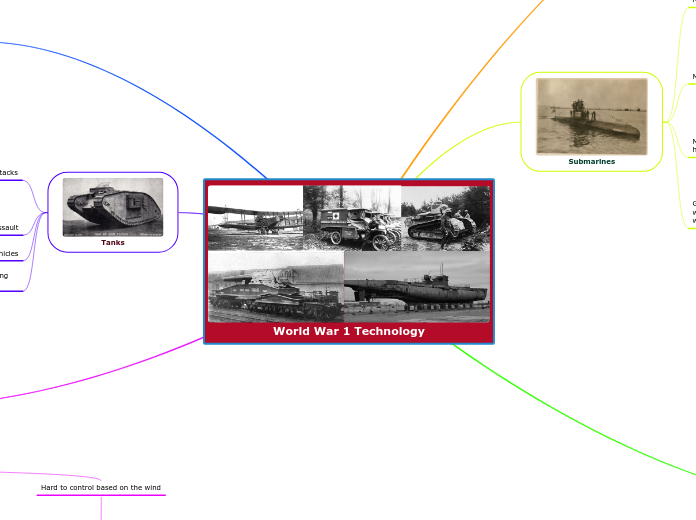World War 1 Technology
Aircraft
Massive development throughout the war
Had only recently been invented (1903)
Different types developed like the monoplane, biplane, and triplane, with different success and number of wings
Originally made for recon/observation however they evolved into more tactile weapons
Machine guns were mounted on top and bombs were thrown from them
Start of dogfights
Not all aircraft was airplanes there were less common zeppelins and bombers
Less effective and not developed
Air fighting was not a major player in winning the war
However there are recognized important flying aces like Billy Bishop for the Allies and the Red Baron for the Central Powers
Billy Bishop
Red Baron
Submarines
Multiple different types of submarines
Coastal subs
Patrol subs
Most commonly used by Germany
Used to take out ally or neutral cargo/supply ships
Seen as unfair since they were not attacking just carrying supplies, Germany considered it fine since they were holding supplies used to hurt them
German U-boats were created to combat Britain's powerful navy
Most commonly used their deck guns but also had torpedoes
Germany sinking the Lusitania (with submarines) was a short term cause for the USA to join the war
USA joining the war brought fresh troops and resources ultimately helping the Allies win the war
Communication
New methods were developed like wireless radios and telephones
Much of the world was using electricity which brought new communication availability
Receiving station
Communication brought swift new advantages
Easier command and control
Good for artillery spotting
Not everything was electric, some classic methods were still being used
Letters were commonly used by soldiers to communicate with home and family
Carrier pigeons were still used for sending info back and forth between trenches and generals
Machine Guns
Rapid fire weapon
(400-800 rounds per minute)
Sat on swiveling stands
Ability to take out mass troops
Most influential weapon of the war
Fastest shooting and reloading of the time
Accounted for approximately 85% of the wars deaths
Tanks
Works best when paired with other attacks
Developed better later in the war by the french
Used for tactile assault
Going over trenches, destroying barbed wire, and machine gun nests
Tracked armoured vehicles
Machine guns or cannons mounted on top
Very difficult to be inside due to the sweltering heat, internal engine, and flying shrapnel
Poison Gas
Used to incapacitate or kill an enemy
Was seen as unfair and was banned from use
Germany did not follow the ban
Different types with different uses
Mustard gas
Lingered on the skin and caused blistering wounds
Chlorine gas
Filled the lungs and could drown you
Tear gas
Blinded and watered the eyes
Hard to control based on the wind
When effective gas masks and safety gear were needed
